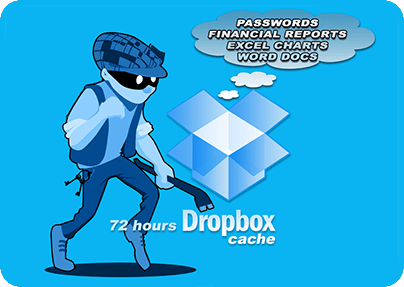If you are one of the hundreds of millions who regularly use Dropbox, there is something you should know: While the service provides a very handy and hassle free way for file storage, syncing and sharing, its cache folder, hidden on your hard drive, can easily turn into a goldmine for hackers. Dropbox cache was designed to offer users a quick and effortless way to restore deleted files, so it retains a copy of every single file you delete, on your HDD.
Even though the cache is automatically emptied in every 3 days, in the meantime there is basically a secret copy of all your deleted Dropbox files on your PC. Now, what if you have deleted some confidential trade secrets, or financial reports, but a malware , or hacker manages to access your hard drive before the files are removed from your Dropbox cache? It sure isn't a secret for cybercriminals where too look for the Dropbox cache folder! It's practically an open secret; Dropbox itself let users clear the cache themselves if they deleted sensitive files and don't want them to remain on the computer for 72 hours. Click here to learn how to do it.
But that's not the end of the story yet. If that privacy issue weren't enough, there is another one, closely related, at hand. This time, it isn't a Dropbox thing, but something your good old Windows throws at you.
The point is, simple file deletion in Windows doesn't guarantee that the file you wanted to get rid of is no longer accessible on the hard drive. When you click "delete" the file gets marked as available for overwriting, but only its reference is deleted from Windows Explorer. However, the file content itself is going to stay on your hard drive until it is overwritten by another file. So in the meantime it can be recovered by third parties.
I'm sure you got the picture by now: Yes, even the files Dropbox auto-deletes from the cache, can be recovered, even after deletion. They will be lying somewhere in the free space and if they happen to be sensitive files, you better remove them for good. How?
Use east-tec Eraser to auto-detect and permanently wipe the content of the Dropbox cache, on a daily basis, or anytime you deleted some highly sensitive data. This step doesn't only help you maintain your privacy, but frees up disk space as well. By regularly running this software you can really make sure that there aren't confidential Dropbox leftovers on your hard drive and that the cache only serves controllable recovery purposes.
While understanding the potential risks associated with Dropbox's hidden cache folder is crucial for safeguarding your data, it's also beneficial to consider the broader landscape of cloud storage solutions. Exploring Dropbox alternatives can offer insights into services with different security features, storage capacities, or collaboration tools that might better suit your specific needs. These alternatives may provide enhanced security measures or functionalities that align more closely with your privacy expectations and workflow requirements.

